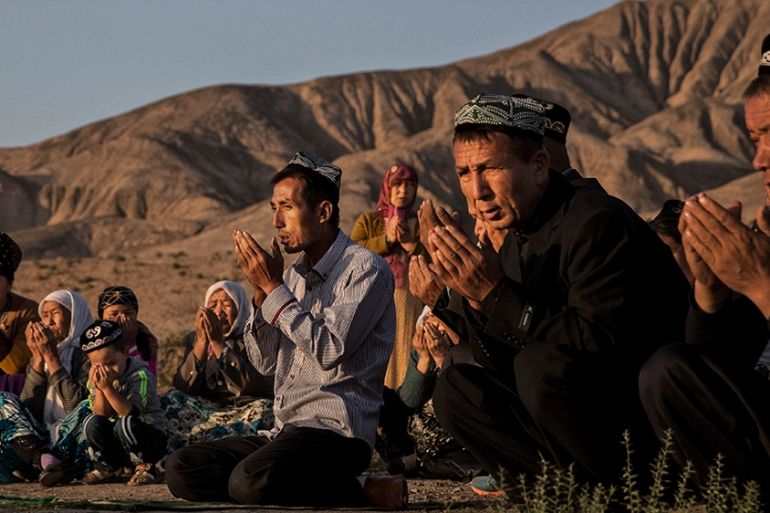China warning on US Uighur bill casts more doubt over trade deal
A near-term trade deal was already looking unlikely after Trump signalled it could wait until late next year.

China warned on Wednesday that United States legislation calling for a tougher response to Beijing’s treatment of its Uighur Muslim minority will affect bilateral cooperation, further clouding the prospects of the world’s two largest economies striking a deal to end their ongoing trade war.
Expectations of a quick, near-term pact to de-escalate tensions had already been dealt a blow after US President Donald Trump said on Tuesday that he “likes” the idea of waiting to make a deal, and signalled it could wait until after the 2020 presidential election next year.
Keep reading
list of 3 itemsTrump ‘likes’ idea of waiting to make a trade deal with China
China threatens to blacklist US firms over human rights disputes
Approval by the US House of Representatives of the Uighur Act of 2019, which still requires passage by the Republican-controlled Senate before being sent to Trump, has angered Beijing and further strained an already testy relationship.
Several sources familiar with Beijing’s stance told Reuters News Agency that the bill could jeopardise the so-called “phase one” trade deal that is already fraught with disagreements and complications.
With a new round of US tariffs on Chinese goods scheduled to take effect in less than two weeks, the possibility of another breakdown is growing.
“Do you think if America takes actions to hurt China’s interests we won’t take any action,” Chinese foreign ministry spokeswoman Hua Chunying told reporters when asked whether the Uighur bill would affect the trade negotiations. “I think any wrong words and deeds must pay the due price.”
Negotiators have continued to work on the trade deal. But sources familiar with the talks say the two sides are still wrangling over the details including whether existing US tariffs on Chinese goods will be removed and how much in additional US agricultural products China will buy.
Citing people familiar with the talks, Bloomberg News reported on Wednesday that Washington and Beijing are “moving closer” to agreeing on the degree to which tariffs would be rolled back in an initial trade deal despite the two countries’ disagreements over key issues such as the treatment of the Uighurs in Xinjiang Province and anti-China protests in Hong Kong.
US Commerce Secretary Wilbur Ross told CNBC on Tuesday that staff-level trade negotiations with China were continuing but no high-level trade talks had been scheduled. Planned US tariffs on remaining Chinese imports will take effect on December 15 barring significant progress in the talks, or a deal, he said.
Hua said China would set no timeline or deadline for a trade deal and would take “decisive” countermeasures to defend its interests if what she called US protectionism and bullying over trade continued.
She did not elaborate on what the measures might be.
A Chinese official who declined to be identified warned that US implementation of the new round of tariffs scheduled on December 15 will be countered by China with retaliatory tariffs – an outcome that the official said would seriously disrupt ongoing negotiations.
Another Chinese government official who declined to be identified said it may take a very long time for Washington and Beijing to reach a deal if they cannot find a way to strike one while “the iron is hot”.
Uighur bill
The Uighur bill, which was passed 407-1 in the Democratic-controlled US House of Representatives, requires the US president to condemn abuses against Muslims and call for the closure of mass detention camps in China’s western region of Xinjiang. It urges Trump to impose sanctions for the first time on a member of China’s powerful Politburo, Xinjiang Communist Party Secretary Chen Quanguo.
Beijing called the bill a malicious attack on China, demanded the US keep it from becoming law and said it would act to defend its interests as necessary.
Vice Foreign Minister Qin Gang made “stern representations” to William Klein, the US embassy’s minister counselor for political affairs, and urged the US to stop interfering in China’s domestic affairs, state TV reported.
The US Embassy in China, in an emailed statement, told Reuters it would not speculate on China’s possible countermeasures.
“We continue to call on the PRC to immediately release all those arbitrarily detained, and to end its draconian policies that for more than two years have terrorized its own citizens in Xinjiang,” the statement said, using the initials of China’s official name, the People’s Republic of China.
The White House has yet to say whether Trump would sign or veto the bill, which contains a provision allowing the president to waive sanctions if he determines that to be in the national interest.
Dilxat Raxit, spokesman for the World Uyghur Congress, said the House bill was an important action opposing “China’s continued push of extreme persecution”, and that the organisation looks forward to Trump signing it into law.
Analysts say China’s response to the passage of the Uighur bill could be stronger than its reaction to a recent US law backing Hong Kong protesters. Beijing said on Monday it banned US military ships and aircraft from visiting the island and sanctioned several US-based nongovernment organisations.
The Global Times, an influential tabloid published by the official newspaper of China’s ruling Communist Party, tweeted on Tuesday that Beijing would soon release a so-called unreliable entities list imposing sanctions against those who harm Chinese interests.
It said China was expediting the process for the list because the US House bill would “harm Chinese firms’ interests”, and that “relevant” US entities would be among the targets.